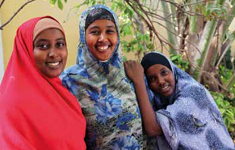Benin, Djibouti, Somalia, Zimbabwe and Liberia show the countries have successfully put national policies in place to advance gender equality, according to a new report by African Development Bank.
The report also stated that the Covid-19 pandemic has sharpened the challenges women face. Prepared in collaboration with the countries and the international partner, UN Women, the Bank’s country gender profiles evaluate gender equality and offer recommendations to drive parity across a range of metrics. These include strategies to bolster the responsiveness of development initiatives.
“The country gender profiles are timely as countries define actions and policies to support recovery from the pandemic. Gender data and analysis are critical but remain limited, slowing the achievement of the gender agenda. We hope these reports will help address this important challenge,” said Amel Hamza, Acting Director for Gender, Women and Civil Society at the Bank.
Benin, Djibouti, Somalia, Zimbabwe and Liberia have achieved progress in addressing discriminatory laws and policies. In addition to establishing national gender policies, the five countries also have institutional mechanisms dedicated to gender equality, such as the Gender Ministry, Gender focal points (and other examples from the profiles).
The report on Somalia stated that atraditionally patriarchal Islamic society, Somali culture is considered socially conservative for women, with women’s lives historically restricted to the ‘private domain’, leading to their constrained role in decision-making, and limited access to assets and resources.
“Yet, women have contributed significantly to peace building efforts in recent years, forging new public roles. New trends are also now visible in the political, social and economic domains.3. This report is intended to inform development assistance policies, and strategies for intensifying impact on gender equality and poverty reduction in Somalia.”
Specifically the Country Gender Profile explores key gender inequalities that continue to constrain inclusive growth, identifies key gaps and challenges in current policies and programmes, and highlights best practices and strategies for action.
The report on Somalia takes a sectoral and institutional level approach to assessing gender equality and inclusion across Somalia and progress since 2012. The value of the report is not in the provision of new statistical data, but instead, in a consolidation of existing data and information, a distillation of emerging trends and perspectives, and institutional analysis.
“The primary focus of the report is on the Federal Government of Somalia (FGS), but trends and perspectives from the semi-autonomous regions of Somaliland and Puntland have also been integrated,” the report on Somalia stated.
The reports nonetheless conclude that women remain disproportionately affected by poverty, and that the Covid-19 pandemic exacerbated gender inequality. During the pandemic, women experienced an increase in gender-based violence, and bore the burden of performing unpaid work or low-paying labor in the informal sector. The reports recommend that gender equality be prioritized in Covid-19 recovery programs.
The Bank issued its first Country Gender Profiles in 2004. The latest publications in the series are part of a roll out of its new Gender Strategy for 2021-2025: “Investing in Africa’s women to accelerate inclusive growth.”

